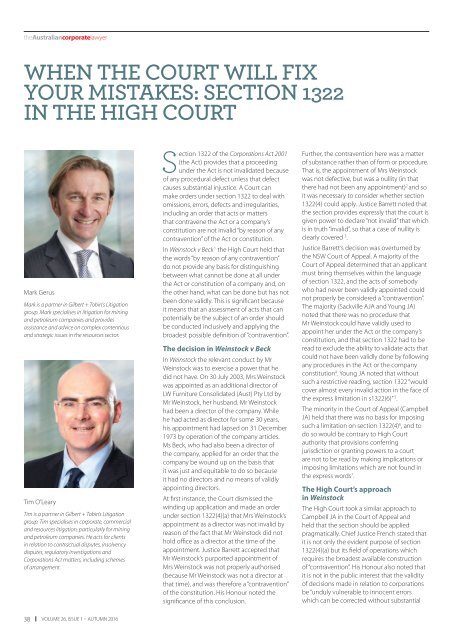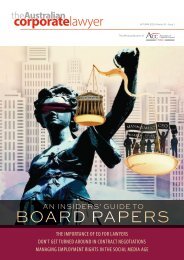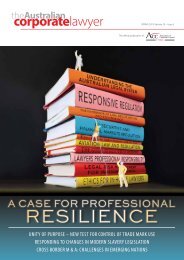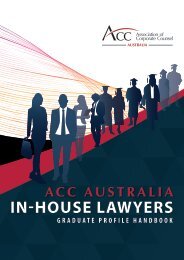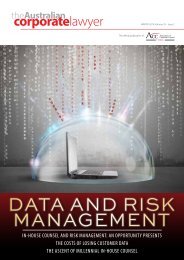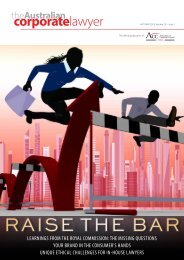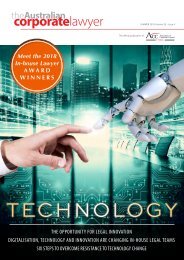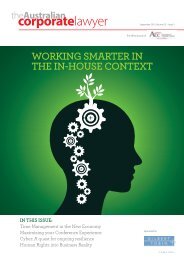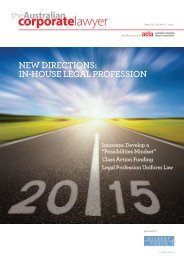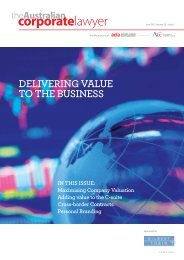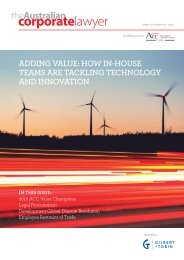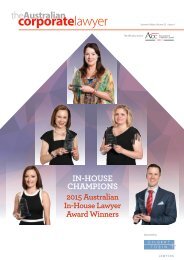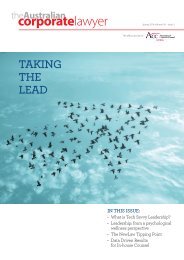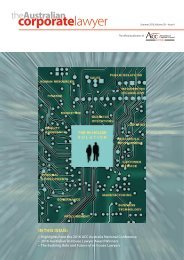Australian Corporate Lawyer - Autumn 2016
Australian Corporate Lawyer is the official publication of the Association of Corporate Counsel (ACC) Australia. The Autumn 2016 issue focuses on 'Advancing your in-House Career' and features a range of articles covering topics including: managing stress; trade marks and domain names; career motivated misconduct and cultural diversity.
Australian Corporate Lawyer is the official publication of the Association of Corporate Counsel (ACC) Australia. The Autumn 2016 issue focuses on 'Advancing your in-House Career' and features a range of articles covering topics including: managing stress; trade marks and domain names; career motivated misconduct and cultural diversity.
You also want an ePaper? Increase the reach of your titles
YUMPU automatically turns print PDFs into web optimized ePapers that Google loves.
the<strong>Australian</strong>corporatelawyer<br />
WHEN THE COURT WILL FIX<br />
YOUR MISTAKES: SECTION 1322<br />
IN THE HIGH COURT<br />
Mark Gerus<br />
Mark is a partner in Gilbert + Tobin's Litigation<br />
group. Mark specialises in litigation for mining<br />
and petroleum companies and provides<br />
assistance and advice on complex contentious<br />
and strategic issues in the resources sector.<br />
Tim O’Leary<br />
Tim is a partner in Gilbert + Tobin’s Litigation<br />
group. Tim specialises in corporate, commercial<br />
and resources litigation, particularly for mining<br />
and petroleum companies. He acts for clients<br />
in relation to contractual disputes, insolvency<br />
disputes, regulatory investigations and<br />
Corporations Act matters, including schemes<br />
of arrangement.<br />
Section 1322 of the Corporations Act 2001<br />
(the Act) provides that a proceeding<br />
under the Act is not invalidated because<br />
of any procedural defect unless that defect<br />
causes substantial injustice. A Court can<br />
make orders under section 1322 to deal with<br />
omissions, errors, defects and irregularities,<br />
including an order that acts or matters<br />
that contravene the Act or a company’s<br />
constitution are not invalid “by reason of any<br />
contravention” of the Act or constitution.<br />
In Weinstock v Beck 1 the High Court held that<br />
the words “by reason of any contravention”<br />
do not provide any basis for distinguishing<br />
between what cannot be done at all under<br />
the Act or constitution of a company and, on<br />
the other hand, what can be done but has not<br />
been done validly. This is significant because<br />
it means that an assessment of acts that can<br />
potentially be the subject of an order should<br />
be conducted inclusively and applying the<br />
broadest possible definition of “contravention”.<br />
The decision in Weinstock v Beck<br />
In Weinstock the relevant conduct by Mr<br />
Weinstock was to exercise a power that he<br />
did not have. On 30 July 2003, Mrs Weinstock<br />
was appointed as an additional director of<br />
LW Furniture Consolidated (Aust) Pty Ltd by<br />
Mr Weinstock, her husband. Mr Weinstock<br />
had been a director of the company. While<br />
he had acted as director for some 30 years,<br />
his appointment had lapsed on 31 December<br />
1973 by operation of the company articles.<br />
Ms Beck, who had also been a director of<br />
the company, applied for an order that the<br />
company be wound up on the basis that<br />
it was just and equitable to do so because<br />
it had no directors and no means of validly<br />
appointing directors.<br />
At first instance, the Court dismissed the<br />
winding up application and made an order<br />
under section 1322(4)(a) that Mrs Weinstock’s<br />
appointment as a director was not invalid by<br />
reason of the fact that Mr Weinstock did not<br />
hold office as a director at the time of the<br />
appointment. Justice Barrett accepted that<br />
Mr Weinstock’s purported appointment of<br />
Mrs Weinstock was not properly authorised<br />
(because Mr Weinstock was not a director at<br />
that time), and was therefore a “contravention”<br />
of the constitution. His Honour noted the<br />
significance of this conclusion.<br />
Further, the contravention here was a matter<br />
of substance rather than of form or procedure.<br />
That is, the appointment of Mrs Weinstock<br />
was not defective, but was a nullity (in that<br />
there had not been any appointment) 2 and so<br />
it was necessary to consider whether section<br />
1322(4) could apply. Justice Barrett noted that<br />
the section provides expressly that the court is<br />
given power to declare “not invalid” that which<br />
is in truth “invalid”, so that a case of nullity is<br />
clearly covered 3 .<br />
Justice Barrett’s decision was overturned by<br />
the NSW Court of Appeal. A majority of the<br />
Court of Appeal determined that an applicant<br />
must bring themselves within the language<br />
of section 1322, and the acts of somebody<br />
who had never been validly appointed could<br />
not properly be considered a “contravention”.<br />
The majority (Sackville AJA and Young JA)<br />
noted that there was no procedure that<br />
Mr Weinstock could have validly used to<br />
appoint her under the Act or the company’s<br />
constitution, and that section 1322 had to be<br />
read to exclude the ability to validate acts that<br />
could not have been validly done by following<br />
any procedures in the Act or the company<br />
constitution 4 . Young JA noted that without<br />
such a restrictive reading, section 1322 “would<br />
cover almost every invalid action in the face of<br />
the express limitation in s1322(6)” 5 .<br />
The minority in the Court of Appeal (Campbell<br />
JA) held that there was no basis for imposing<br />
such a limitation on section 1322(4) 6 , and to<br />
do so would be contrary to High Court<br />
authority that provisions conferring<br />
jurisdiction or granting powers to a court<br />
are not to be read by making implications or<br />
imposing limitations which are not found in<br />
the express words 7 .<br />
The High Court’s approach<br />
in Weinstock<br />
The High Court took a similar approach to<br />
Campbell JA in the Court of Appeal and<br />
held that the section should be applied<br />
pragmatically. Chief Justice French stated that<br />
it is not only the evident purpose of section<br />
1322(4)(a) but its field of operations which<br />
requires the broadest available construction<br />
of “contravention”. His Honour also noted that<br />
it is not in the public interest that the validity<br />
of decisions made in relation to corporations<br />
be “unduly vulnerable to innocent errors<br />
which can be corrected without substantial<br />
38 VOLUME 26, ISSUE 1 – AUTUMN <strong>2016</strong>


